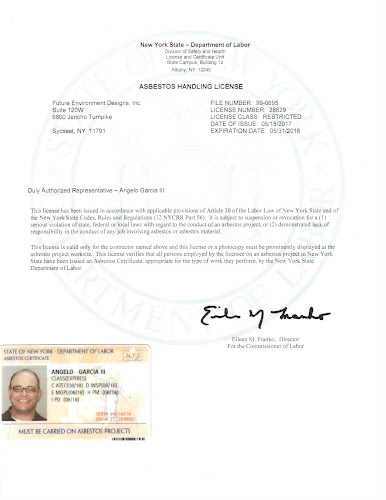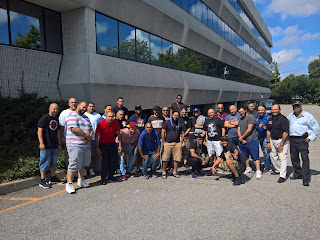This question is the overwhelming number one question we at Future Environment Designs (FEDTC) are being asked at this time. So, to answer this question we must remember that there are two agencies that regulate asbestos licensing and training. The license (companies are licensed; individuals get certificates) or more appropriately the asbestos certificate (hard card) is issued by the New York State Department of Labor (NYSDOL). This certificate expires annually on the last day of your birth month. Currently, NYSDOL is enforcing expiration dates on certificates. You may continue to work with your existing cards as long as it is not expired. In addition, NYSDOL is no longer extending the number of days you can work with a DOH 2832 form when you took an initial course. NYSDOL is allowing you to work with the DOH 2832 form for 45 days.
 |
| Hard card with picture (certificate) & Company license |
The second agency that plays a part in this is the New York State Department of Health (NYSDOH). The NYSDOH enforces 10 NYCRR Part 73 Asbestos Safety Program Requirements which regulates the asbestos training providers and also says that the training certificate (the DOH 2832 Form, the piece of paper you get once the class is completed) expires after one year on the date you took the training. In addition, it has a grace period after that date that lasts a year. Once the grace period is over you must take an initial course to get another certificate (DOH 2832) for that title. Realize there has not been any waiver on this issue and so you will need to keep an eye on your training certificate expiration date and make sure you don't go over the grace period. NYSDOH is now allowing virtual instructor-led courses, see FEDTC's Wednesday, May 27, 2020, blog post on the requirements for that training. Because of this, there is no need to let your hard card or your training certificate expire.
 | |
|
Those of you who work in New York City, New York City Department of Environmental Protection (NYCDEP) regulate Asbestos Rules and Regulations, Title 15, Chapter 1 of the Rules of the City of New York. This regulation also has certificates (NYCDEP hard cards) for individuals who are handlers, handler supervisors, investigators, and restricted handlers. These hard cards expire every two years based on your birthday (but you must still meet the NYSDOL & NYSDOH requirements of training every year). NYCDEP is allowing workers whose hard card expired on March 15, 2020, or later to continue to work using their existing card until August 31, 2021. See NYCDEP's Extension of Asbestos Certification Deadline website for more information.
Hopefully, that answers everyone's questions and we hope to see you in a virtual or in-person class soon.









